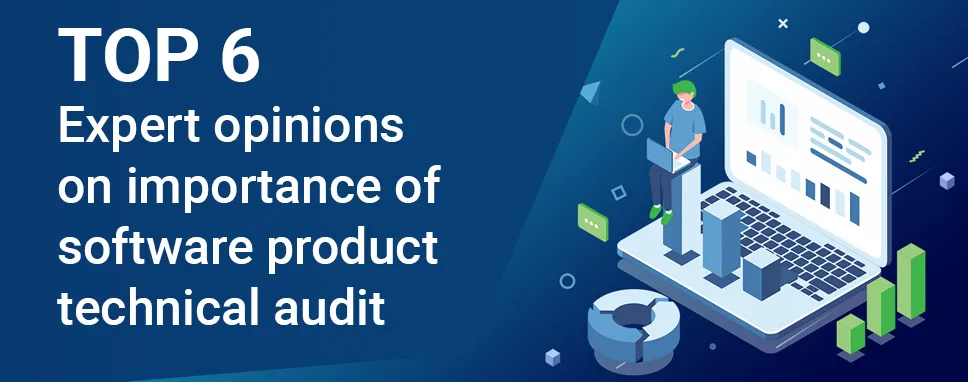What’s New in ASP.NET Core 10 – Key Features & Expert Insights
We tracked the evolution of .NET 9 on Reddit, and watched the heated debates on .NET 6 vs .NET 8. And just when we thought that things had finally settled, Microsoft drops another...
Listening is fun too.
Straighten your back and cherish with coffee - PLAY !

To avoid the detrimental effects on the Company’s value and standards, a Technical audit is much necessary.Just as the software product needs regular testing strategies, so too it needsthe technical auditat regular intervals of SDLC.The main aim of the technical audit is to eliminate the uncertain and unnecessary obstacles that occurred while development.Iteventually helps in improving software quality.
Generally, the technical audit would be performed by a bunch of professionals such as Project Managers, Team-Lead, Business Analysts, and Quality Analysts.They try to find latest tools, and techniques pinpointing uncertain obstacles that occur.Examining every phase of the product life cycle, this team ensures fine working and quality of it.
Here we have listed few tips of the icebergthat help you to understand the indispensable need for the technical audit.
“Conducting a technical audit on a software product is an important part of ensuring that software is ready for end users. The more time spent in technical review and the more errors caught before product launch, the less time will need to be invested in maintenance that could otherwise be avoided.
If end users find the error, they will contact your technical support team. There will be many individuals that need to report the error before it is corrected. This wastes developers and support team members' time, not to mention hurts the user experience.”
- Melanie Green, Content Director at KitelyTech
“Audits are but one of the review processes available for product development, and not just for software. The others are reviews, walk throughs, and inspections. Each have specific goals or objectives.
Management reviews are generally directed toward planning activities, for example, test plans, project management plans, risk management plans, and product management plans such as configuration management and test and verification plans. The goal is to ensure the plans are competent and the organization can support the effort in material and talent which includes sufficient competence and volume. This is a formal approach, with formal assigned roles, and with formal defined objectives.
Technical reviews are similar to management reviews but directed at specific technical work products. These reviews can be formal, and informal. For example, a formal technical review may be conducted of software (and hardware) requirements specification, software design documentation, release notes for hardware and software, and software test documentation (test cases). A formal review will have defined roles, and objectives. The reviews will have a specific focus, that is objective for a specific reviewing event. Informal reviews are not structured, for example, I take aschematic, drawing, or flowchart of an algorithm I propose to use in a piece of software to another engineers desk, and we critique it.
Are where the design team demonstrates how the design is going to work in the context of the customer's use. This is done to close any gap between the customer's need and the product development (software engineering) team's proposed design. The technical staff will describe how the product works, in terms of customer interaction with the product. Performing walk throughs with the customer helps us
Inspections explore the software product to discover anomalies. This discovery is accomplished via a peer review or examination of the work product.
The purpose of an audit is to ensure that the processes, procedures, and other similar intermediate deliverables that were agreed upon, have actually been appropriately developed and deployed over the course of the effort. Audits happen sporadically or periodically throughout the work, not only at the end of the effort. Audits are done to ensure those things we believe to be important (that we defined earlier) for the successful development of the software, have actually been performed and performed in such a way that meet expectation. For example, we have configuration management plans to which we are expecting the development to adhere. We will review how we are actually performing configuration management, reviewing artifacts and deliverables comparing to what we said we were going to do. Does our software / hardware release notes conform? Does our configuration item names follow or define nomenclature and convention? Are we including the appropriate team members, and are we following the defined and agreed upon change management process? Is our software change management in accordance with our configuration and change management processes? Audits are also able to provide some glimpse into whether the actual artifacts being produced from the process. In this way we can identify where the agreed upon processes are not capable.
Audits are important to assess our ways of working (processes) and intermediate work products. The last thing we would want is to discover near the end of the effort that we are not doing the work correctly, resulting in poor work products produced and in rework, and waste of time in general. Audits provide us the opportunity to take actions earlier, when we find that we are not performing in the way that is congruent with successful product development. Knowing this we are able to take appropriate actions, to remedy the situation. For example, if a process is not capable, we can change the process. If the processes are not being followed, we can identify training or tools that can improve the outcome.”
- Jon M Quigley from Value Transformation LLC
“During the development lifecycle, it's normal for software to come out of the process with bugs. You can think of security vulnerabilities as a type of bug. They're either unintended consequences of implementing a feature in a certain way or issues with the way the code is written. Rarely do software engineers intentionally introduce security weaknesses into source code. There are multiple reasons to audit a software product.
The most important is to find and address security vulnerabilities and issues as early on in the software development lifecycle as possible. The earlier in the process the vulnerabilities are addressed, the less it costs the organization to remediate or prevent them. The most optimal situation is to design them out of a software product during the initial design phases.
Using a combination of techniques like source code reviews, peer reviews, and penetration tests and assigning information security personnel to be a member of a software product's team helps assure that the product is audited from a security perspective throughout each stage of the SDLC and reduces the chances for security weaknesses. The other reason for technical audits is compliance with applicable regulations, internal policies, and compliance requirements. Lastly, in some cases, customers may have security requirements embedded in their contracts.”
- Steve R. Smith, CEO of Consumer Affinity
“Audits are super important to do on your own projects and when you take over a project from other developers. It’s necessary to do audits to review if the architecture is correct if you don’t have any performance issues if the project is using best security practices, doing quality assurance, and making sure developers are writing clean code. These are some of the most important ones but of course, adits include a lot more and it can be different depending on a project.”
- KasparsMilbergs, Chief Technology Officer at On The Map, Inc.®
“When we were building our latest software for booking appointments with doctors, we devoted several weeks to audit our product. We brought in an experienced developer into a couple of our meetings to check what we had built and suggested improvements. After this, we tested the entire system and all it improvements before we cleared the software for use. This external audit of software, helps to reduce bias and gets you a more objective assessment of what you have built.”
- OmieteCharles-Davies of onedoctor.app
“Businesses tend to perform technical audits of their softwares, mostly to monitor, record, and improve the functions and operations. In the grander scheme of things, it is a highly effective and efficient policy as it allows developers to weed out any bugs and giving the customers the best product possible.
The most important reason for such a technical audit is undoubtedly the time it saves. Traditional trial-and-error methodology is not only time consuming, but cumbersome. While it might work for small and medium firms, larger organizations will create more problems for themselves by opting for these traditional methods. Not to mention the higher risk of human error. On the other hand, a technical audit done via a reliable software can finish the job more proficiently within a much shorter span of time without creating the logistical nightmares of traditional methods.”
- Yasir Nawaz, Digital Content Producer at Pure VPN
Making timely technical audits not only helps to improve the product’s functionality but also helps to identify the gaps between what was required and what has delivered.This situationoccursdue tomisunderstanding among the developers. Hence, with the technical audit process, it becomes easy to identify such concerns.
Whilethe technical audit process, professionals would identify so many issues that occur due to theusage of outdated/old libraries.This condition would impel us to look for the updated technologies to withstand such issues and provide an opportunity for the team to learn new things. It ultimatelyhelps in identifying new technologies for future developments.
Technical audit plays a significant role in identifying the fissures between the exact requirements and delivered features. It also helps in mitigating and addressing the obstacles by providing advance notice of it. Here in this blog, we have discussed the significant factors that derive the importance of technical audit for the software product. These factors would help in the overall improvement of a software product leading to the business’s success.

We tracked the evolution of .NET 9 on Reddit, and watched the heated debates on .NET 6 vs .NET 8. And just when we thought that things had finally settled, Microsoft drops another...

Several experts, particularly those just starting out, often find themselves confused about WPF and UWP, wondering if they are the same. Since they are used to create great UIs for...

Many companies rely on advanced technologies to make informed decisions in their business. For instance, some Chief Technology Officers (CTOs) turn to Power BI consulting services,...